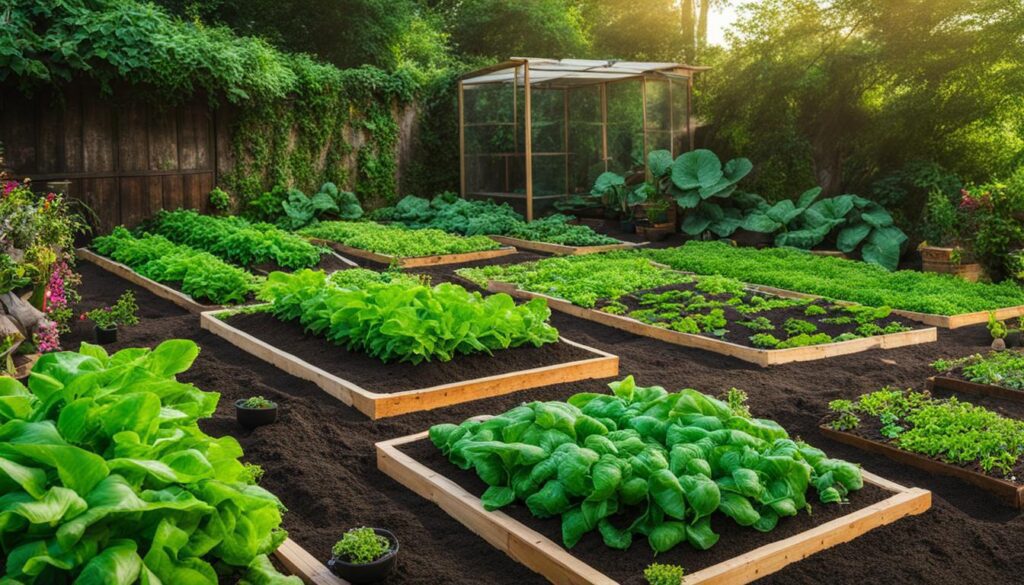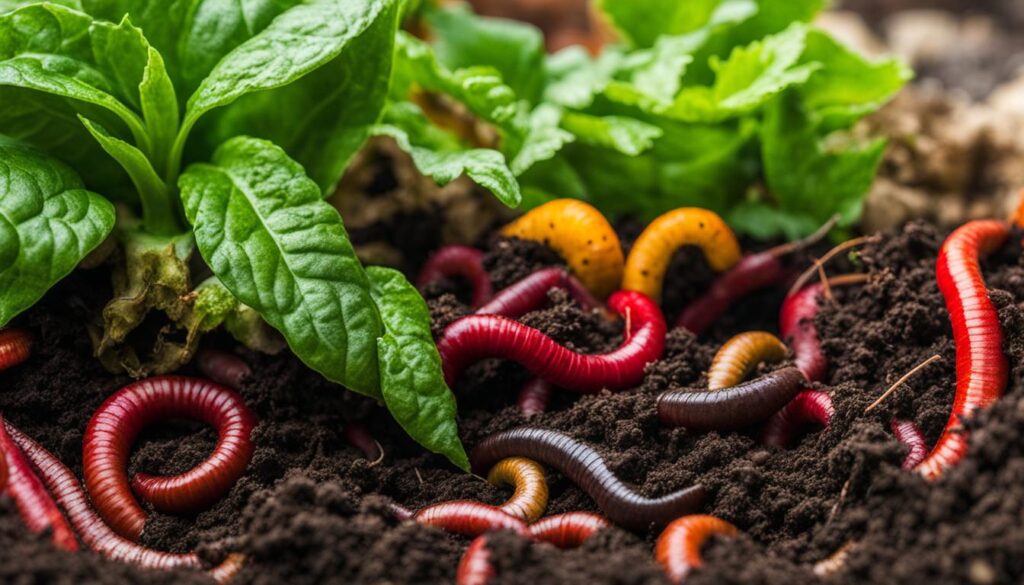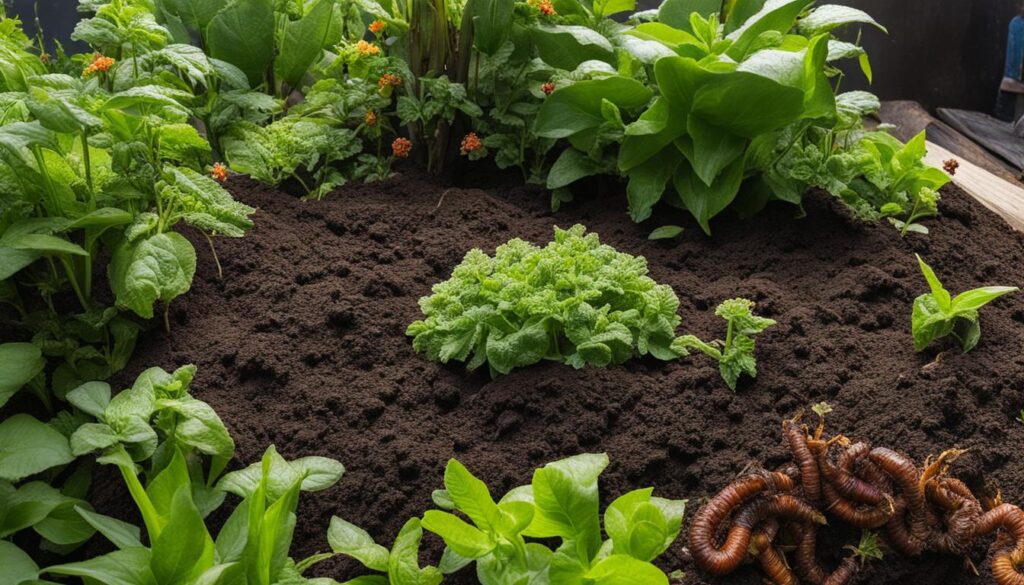Are you looking for a natural and effective way to enhance the growth of plants in your garden? Look no further than vermicompost for plants. Also known as worm castings, vermicompost is an organic and nutrient-rich fertilizer that can transform your garden into a thriving oasis of greenery. Produced through the process of vermicomposting, which involves feeding organic waste to worms and allowing them to break it down into a rich soil amendment, vermicompost offers numerous benefits for plants.
Using vermicompost in your garden can improve soil structure, increase water retention, and enhance nutrient availability – resulting in healthier and more vibrant plant growth. Whether you have bountiful harvests in mind or simply want to enjoy the beauty of flourishing flowers, vermicompost can help you achieve your gardening goals.
Key Takeaways:
- Vermicompost, or worm castings, is a nutrient-rich and organic fertilizer for plants.
- Vermicompost is produced through vermicomposting, a process that involves feeding organic waste to worms.
- Using vermicompost can improve soil structure, increase water retention, and enhance nutrient availability.
- It can be used in various ways, including as a seed-starting boost, top dressing, or potting mixture.
- Vermicompost offers more nutrients and better water-holding capacity compared to traditional compost.
How to Use Vermicompost for Plants
If you want to optimize the benefits of vermicompost for your plants, there are various ways to incorporate it into your gardening routine. Whether you have indoor plants or a vegetable garden, vermicompost can be used effectively to promote healthy growth and nourishment.
For indoor plants, you can use vermicompost as a seed-starting boost. Simply add a small amount of vermicompost to the seed-starting medium for your indoor seedlings. This will provide them with the necessary nutrients to thrive from the early stages of growth. Additionally, you can sprinkle vermicompost along the trench or holes for outdoor seed planting, ensuring that the young plants receive a nutrient-rich surrounding as they emerge.
When it comes to outdoor plants, vermicompost can be used as a top dressing. Apply a layer of vermicompost to the drip line of your plants, as this will provide them with a consistent supply of nutrients and enhance water retention in the soil. This method is particularly beneficial for established plants that require ongoing nourishment.
In vegetable gardens, incorporating vermicompost into the soil is highly effective. Mix vermicompost into the soil when preparing the garden beds or apply it as a top dressing. This will boost the overall fertility of the soil, leading to healthier plants and more abundant harvests. The increased nutrient availability from vermicompost can also improve the plants’ resistance to diseases, ensuring a thriving garden.
Table: How to Use Vermicompost for Plants
| Plant Type | Application Method |
|---|---|
| Indoor Plants | Seed-starting boost: Add vermicompost to seed-starting medium |
| Outdoor Plants | Top dressing: Apply vermicompost along the drip line |
| Outdoor Plants | Outdoor seed planting: Sprinkle vermicompost along trench or holes |
| Vegetable Gardens | Mix vermicompost into the soil or apply as a top dressing |

Vermicompost is a versatile resource that can be used in various ways to support the growth of different types of plants. Experiment with different application methods to find what works best for your garden. Remember to always follow the recommended guidelines for vermicompost usage and ensure that your plants are receiving the proper amount of nutrients for optimal growth.
Vermicompost vs Traditional Compost
When it comes to choosing the right fertilizer for your plants, the debate between vermicompost and traditional compost is a common one. Both offer benefits, but understanding their differences can help you make an informed decision.
Vermicompost, also known as worm castings, is produced through the process of vermicomposting, where organic waste is fed to worms, resulting in nutrient-rich compost. It is higher in nutrients compared to traditional compost and has improved water-holding capacity, making it a more efficient fertilizer. Additionally, vermicompost contains beneficial microorganisms that contribute to the overall health of the soil and plants. In contrast, traditional compost is typically produced by the decomposition of organic matter without the involvement of worms. Although it still provides nutrients to plants, it may require larger quantities to achieve the same results as vermicompost.
“Vermicompost is higher in nutrients and has better water-holding capacity compared to traditional compost.”
Choosing between vermicompost and traditional compost depends on your specific gardening needs. If you’re looking for a nutrient-rich and concentrated fertilizer that enhances soil structure and promotes overall plant health, vermicompost may be the ideal choice. However, if you have access to a larger amount of traditional compost and prefer a more traditional approach to gardening, it can still be a viable option. Ultimately, the decision should be based on your gardening preferences, the availability of resources, and the specific needs of your plants.
Table: A Comparison of Vermicompost and Traditional Compost
| Vermicompost | Traditional Compost | |
|---|---|---|
| Nutrient Content | Higher nutrient content | Lower nutrient content |
| Water-holding Capacity | Better water-holding capacity | Less water-holding capacity |
| Microorganisms | Contains beneficial microorganisms | May contain some microorganisms |
| Availability | May require specific production methods | More widely available |
Note: The information provided in this table is based on general characteristics and may vary depending on specific composting processes and ingredients used.
When considering the choice between vermicompost and traditional compost, it’s important to weigh the benefits and characteristics of each. Understanding how these two fertilizers differ can help you make an informed decision that aligns with your gardening goals and preferences.
Vermicomposting for Healthier Plants
Vermicomposting is a natural and sustainable gardening practice that can greatly benefit the health of your plants. By creating an ideal environment for worms to break down organic waste, vermicomposting produces nutrient-rich vermicompost that enhances soil structure, improves water retention, and increases nutrient availability. These factors contribute to healthier plants and more productive gardens.
One of the key benefits of vermicomposting is the production of vermicompost tea. This is the excess liquid that collects at the bottom of the vermicompost bin. Vermicompost tea is a powerful plant booster that can be applied to plants through foliar feeding or soil drenching. It provides a steady supply of nutrients, promoting robust growth and overall plant health.
When it comes to vermicomposting, it’s important to create the right conditions for the worms. They thrive in a moist environment with a balanced mix of carbon-rich and nitrogen-rich materials. You can feed them fruit and vegetable scraps, coffee grounds, shredded paper, and other organic waste. Avoid adding meat, dairy, and oily foods, as they can attract pests.
Regularly monitoring and maintaining the vermicompost bin is crucial. Ensure that the bedding remains moist, but not overly wet, and provide proper aeration to prevent odors and excessive moisture. It’s also important to harvest the vermicompost regularly to make room for the worms to continue their work. Use the mature vermicompost in your garden to enjoy the benefits of this rich organic fertilizer.

Table: Nutrient Comparison of Vermicompost and Traditional Compost
| Nutrient | Vermicompost | Traditional Compost |
|---|---|---|
| Nitrogen (N) | High | Medium |
| Phosphorus (P) | Medium | Low |
| Potassium (K) | Medium | Medium |
| Microorganisms | Abundant | Varies |
| Water retention | Excellent | Good |
Table: A comparison of the nutrient content and water retention capabilities of vermicompost and traditional compost. Vermicompost is higher in nitrogen and contains abundant beneficial microorganisms, making it a nutrient-rich and efficient fertilizer. It also has excellent water retention properties, creating a favorable growing environment for plants.
Benefits of Vermicompost for Plants
Vermicompost offers a wide range of benefits that can greatly enhance the growth and overall health of your plants. As a nutrient-rich organic fertilizer, vermicompost provides essential nutrients to plants, promoting strong and vibrant growth. The improved soil structure that vermicompost brings also enhances water retention and drainage, creating a healthy growing environment for your plants. This means that even during periods of drought or heavy rainfall, your plants will have the necessary moisture and nutrients to thrive.
Additionally, vermicompost stimulates beneficial microbial activity in the soil, which aids in nutrient cycling and promotes plant health. The presence of these microorganisms improves the overall fertility of the soil, making it easier for plants to access nutrients and ensuring that they receive a balanced supply. With vermicompost, you can rest assured that your plants are receiving the necessary nourishment for optimal growth and development.
Furthermore, vermicompost is a sustainable and environmentally friendly option for gardeners. By using this organic fertilizer, you are recycling organic waste and reducing the need for synthetic fertilizers. This not only benefits your plants but also contributes to the health of the surrounding ecosystem. Vermicompost is a natural and eco-conscious choice that aligns with sustainable gardening practices.
Beyond its nutritional benefits, vermicompost also helps to suppress diseases in plants, enhances soil biodiversity, and improves overall crop yields. It is a versatile and effective gardening aid that can be used in various ways, such as a seed-starting boost or a top dressing for established plants. Whether you have a vegetable garden, flower beds, or indoor plants, vermicompost can play a crucial role in optimizing plant growth and ensuring gardening success.
| Benefits of Vermicompost for Plants | Summary |
|---|---|
| Enhances soil structure | Improves water retention and drainage |
| Provides essential nutrients | Stimulates beneficial microbial activity |
| Reduces the need for synthetic fertilizers | Supports sustainable gardening practices |
| Suppresses diseases in plants | Enhances soil biodiversity |
| Improves overall crop yields | Optimizes plant growth |

“Using vermicompost in my garden has significantly improved the health and productivity of my plants. The soil is richer and more fertile, and my plants are greener and more vibrant than ever before. It’s a natural and sustainable way to give your plants the nutrients they need. I highly recommend incorporating vermicompost into your gardening routine!” – David, avid gardener
Conclusion
In conclusion, vermicompost is an invaluable addition to your gardening routine. With its nutrient-rich composition, improved soil structure, and increased water retention properties, vermicompost provides the ideal conditions for healthy and vibrant plant growth. By utilizing vermicompost in various ways, such as seed-starting boost, top dressing, potting mixture, or soil amendment, you can ensure that your plants receive the necessary nutrients for optimal development.
Not only does vermicompost enhance soil quality and provide a balanced supply of nutrients, but it also stimulates beneficial microbial activity in the soil, contributing to a thriving ecosystem. These benefits result in stronger, more productive plants that are better equipped to resist diseases and produce bountiful harvests.
Whether you’re an experienced gardener or just starting out, embracing the power of vermicompost can unlock the full potential of your garden. Incorporate this natural fertilizer into your gardening practices, and enjoy the rewards of healthier, more vibrant plants that will beautify your garden and provide you with a sense of satisfaction.
FAQ
What is vermicompost?
Vermicompost, also known as worm castings, is a nutrient-rich and organic fertilizer that is produced through the process of vermicomposting. It involves feeding organic waste to worms and allowing them to break it down into a rich soil amendment.
How can I use vermicompost in my garden?
There are several ways to use vermicompost in your garden. You can use it as a seed-starting boost, as a top dressing for plants, as a potting mixture for indoor plants, or incorporate it into the soil in vegetable gardens.
What is the difference between vermicompost and traditional compost?
Vermicompost has a higher nutrient content compared to traditional compost and is more concentrated. It also has a better water-holding capacity and contains beneficial microorganisms. Traditional compost is typically produced without involving worms and may require larger quantities to achieve the same results.
How does vermicomposting contribute to overall plant health?
The process of vermicomposting creates an ideal environment for worms to break down organic waste, leading to the production of nutrient-rich vermicompost. This compost enhances soil structure, improves water retention, and increases nutrient availability, resulting in healthier plants.
What are the benefits of using vermicompost for plants?
Vermicompost improves soil quality, enhances water retention and drainage, and provides a balanced and readily available supply of nutrients. It also stimulates beneficial microbial activity in the soil, leading to stronger and more productive plants.
What are the recommended practices for using vermicompost for plants?
To maximize the benefits of vermicompost, you can use it as a seed-starting boost, a top dressing, a potting mixture for indoor plants, or incorporate it into the soil in vegetable gardens. The choice depends on your specific gardening needs and preferences.